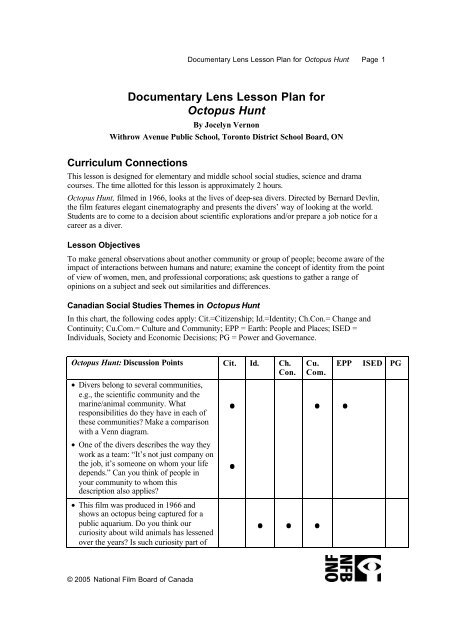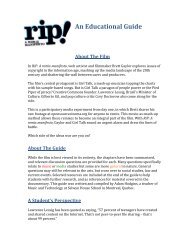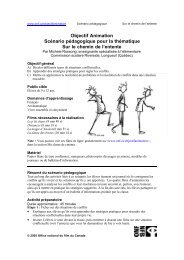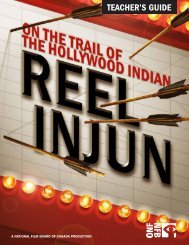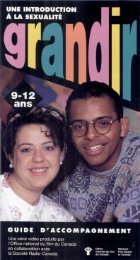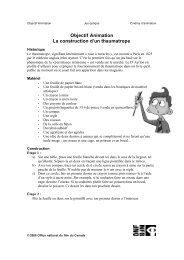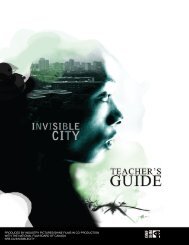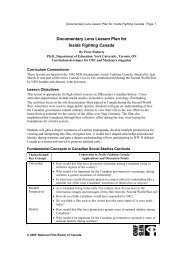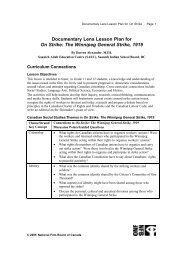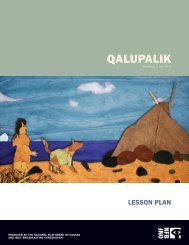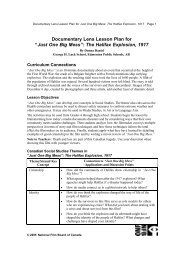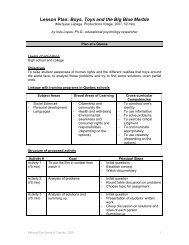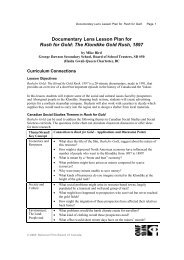Documentary Lens Lesson Plan for Octopus Hunt - Office national ...
Documentary Lens Lesson Plan for Octopus Hunt - Office national ...
Documentary Lens Lesson Plan for Octopus Hunt - Office national ...
- No tags were found...
You also want an ePaper? Increase the reach of your titles
YUMPU automatically turns print PDFs into web optimized ePapers that Google loves.
<strong>Documentary</strong> <strong>Lens</strong> <strong>Lesson</strong> <strong>Plan</strong> <strong>for</strong> <strong>Octopus</strong> <strong>Hunt</strong> Page 1<strong>Documentary</strong> <strong>Lens</strong> <strong>Lesson</strong> <strong>Plan</strong> <strong>for</strong><strong>Octopus</strong> <strong>Hunt</strong>By Jocelyn VernonWithrow Avenue Public School, Toronto District School Board, ONCurriculum ConnectionsThis lesson is designed <strong>for</strong> elementary and middle school social studies, science and dramacourses. The time allotted <strong>for</strong> this lesson is approximately 2 hours.<strong>Octopus</strong> <strong>Hunt</strong>, filmed in 1966, looks at the lives of deep-sea divers. Directed by Bernard Devlin,the film features elegant cinematography and presents the divers’ way of looking at the world.Students are to come to a decision about scientific explorations and/or prepare a job notice <strong>for</strong> acareer as a diver.<strong>Lesson</strong> ObjectivesTo make general observations about another community or group of people; become aware of theimpact of interactions between humans and nature; examine the concept of identity from the pointof view of women, men, and professional corporations; ask questions to gather a range ofopinions on a subject and seek out similarities and differences.Canadian Social Studies Themes in <strong>Octopus</strong> <strong>Hunt</strong>In this chart, the following codes apply: Cit.=Citizenship; Id.=Identity; Ch.Con.= Change andContinuity; Cu.Com.= Culture and Community; EPP = Earth: People and Places; ISED =Individuals, Society and Economic Decisions; PG = Power and Governance.<strong>Octopus</strong> <strong>Hunt</strong>: Discussion Points Cit. Id. Ch.Con.• Divers belong to several communities,e.g., the scientific community and themarine/animal community. Whatresponsibilities do they have in each ofthese communities? Make a comparisonwith a Venn diagram.• One of the divers describes the way theywork as a team: “It’s not just company onthe job, it’s someone on whom your lifedepends.” Can you think of people inyour community to whom thisdescription also applies?Cu.Com.• • ••EPP ISED PG• This film was produced in 1966 andshows an octopus being captured <strong>for</strong> apublic aquarium. Do you think ourcuriosity about wild animals has lessenedover the years? Is such curiosity part of• • •© 2005 National Film Board of Canada
<strong>Documentary</strong> <strong>Lens</strong> <strong>Lesson</strong> <strong>Plan</strong> <strong>for</strong> <strong>Octopus</strong> <strong>Hunt</strong> Page 3<strong>Octopus</strong> <strong>Hunt</strong>: Discussion Points Cit. Id. Ch.Con.• “Divers are a strange breed of people…you think, my God, how similar thesepeople are to me!” What elementscontribute to creating a “breed” or groupidentity? Can it occur between people nomatter where they are in the world? Doesit come simply from spending timetogether? Or do we need to sharecommon interests?• Think of your identity in relation to yourfriends, your family, your teacher(s) andthe people in your community. Whatstarted these relationships? What makesthem last?Assessment StrategiesCu.Com.• • •• During the discussions, students are expected to share their ideas in a clear, organizedmanner, to use concrete examples to back up opinions, and to ask others <strong>for</strong> clarificationwhen necessary.EPP ISED PG• In Activity 1, Underwater Scenario, you could use anecdotal observations of the student’smovements and gestures during the drama pre-activity. The student’s movements should beconsistent with gravity on Earth and under water.• In Activity 3, Job Opportunity, the student should be able to give a clear description of thejob and make the connection between career expectations and a person’s outlook and skills.Materials and Resources• The three worksheets at the end of these notes.Web links• Institut maritime du Québec: . A page, inEnglish, about a career as a professional diver.• A diving school: • Oliver Perrin’s personal page (in French):• Dept. of Fisheries and Oceans Canada (on the protection of marine mammals): Activities <strong>for</strong> <strong>Octopus</strong> <strong>Hunt</strong>Worksheet A features questions that can serve as oral and written talking points during the lesson.They focus on skills in storytelling, making connections and reflecting on issues.© 2005 National Film Board of Canada
<strong>Documentary</strong> <strong>Lens</strong> <strong>Lesson</strong> <strong>Plan</strong> <strong>for</strong> <strong>Octopus</strong> <strong>Hunt</strong> Page 4Introductory ActivityACTIVITY 1: Underwater Scenario1) Ask the class to name the equipment needed <strong>for</strong> deep-sea diving. Write their ideas on theboard.2) Ask students to imagine they are wearing all the equipment they just listed. They are to mimehow they would move with that equipment on if they were on land. They should show that itis heavy and awkward.3) Then ask students to pretend to dive into the water. They should show that they suddenlybecome weightless and seem to float. Ask them to imagine what it is like under the water;they will likely suggest that it is dark and silent.4) Ask them to describe their feelings. What do they see? Are they afraid? Curious? Whatproblems might occur under the water? Would they dive alone?5) Ask students if they would like to go diving. Number the corners of the classroom from 1 to4.• Corner #1 represents “Yes, absolutely!”• Corner #2 represents “Hmmm… maybe.”• Corner #3 represents “Probably not.”• Corner #4 represents “No, not at all!”Invite students to go to the corner that corresponds to their position and discuss the ir choice.6) Introduce the theme of the film: young divers go in search of an octopus and bring it back <strong>for</strong>a public aquarium. Tell students that after they view the film, they will be asked to reflect onthe exploration of unknown regions of the world and decide whether they are <strong>for</strong> or againstscientific exploration. The film highlights the viewpoints and emotions of the divers.Developing Concepts and Applying What You Have LearnedACTIVITY 2: Making a Decision1) Show the film, <strong>Octopus</strong> <strong>Hunt</strong>.2) Hand out Worksheet B, Making a Decision. The suggested question is, Am I in favour ofscientific exploration? Or, you could use one of the discussion questions from worksheet A.The students in each of the four corners (from Activity 1 above) will work together to set outtheir reasons “<strong>for</strong>” and “against” the question. They can write their responses in theappropriate columns on the worksheet.3) When they have finished, ask the “<strong>for</strong>” students to <strong>for</strong>m a group and the “against” students to<strong>for</strong>m another group. They will discuss the reasons behind their decisions.ACTIVITY 3: Job OpportunityAsk students to brainstorm the skills and strengths necessary <strong>for</strong> deep-sea diving. Write ideas onthe board under these four headings: Education, Physical Skills, Social Skills and WorkingConditions.Hand out Worksheet C, Job Opportunity: Professional Diver. Ask students to use the results oftheir brainstorming to write up a job notice.© 2005 National Film Board of Canada
<strong>Documentary</strong> <strong>Lens</strong> <strong>Lesson</strong> <strong>Plan</strong> <strong>for</strong> <strong>Octopus</strong> <strong>Hunt</strong> Page 5Extension and Alternative Activities1) Have a debate on the question from Activity 2, Making a Decision.2) Imagine that the federal government is offering a summer diving program <strong>for</strong> young people11 to 16. Students make a poster or pamphlet describing the program.3) Read the interview with professional diver Pierre Lecompte (in French) at. Discuss thedifferences between professional, commercial and sport diving.4) You could change Activity 3, Job Opportunity, by replacing the written job notice with anoral one, <strong>for</strong> radio or television.© 2005 National Film Board of Canada
<strong>Documentary</strong> <strong>Lens</strong> <strong>Lesson</strong> <strong>Plan</strong> <strong>for</strong> <strong>Octopus</strong> <strong>Hunt</strong> Page 6Worksheet A: <strong>Octopus</strong> <strong>Hunt</strong>: Questions Based on Concepts• Divers belong to several communities, <strong>for</strong> example the scientific community and themarine/animal community. What responsibilities do they have in each of thesecommunities? Make a comparison using a Venn diagram.• One of the divers describes the way they work as a team: “It’s not just company on thejob, it’s someone on whom your life depends.“ Can you think of people in yourcommunity to whom this also applies?• This film was produced in 1966 and shows an octopus being captured <strong>for</strong> a publicaquarium. Do you think our curiosity about wild animals has lessened over the years? Issuch curiosity part of human nature?• One of the divers describes “going under the water <strong>for</strong> the first time, to really exist underthe water…” Why does he speak of existing rather than swimming?• At your age, do you believe you exist in your daily life, or do you simply follow thestandard patterns established by society?• One diver admits that she feels like she’s “intruding” on the world of the octopus. Do youagree?• Does do the word “intruder” have a positive or negative connotation?• Think of other situations in the world today where humans enter non-humanenvironments. Should we be there? What are the possible consequences?• Two of the divers in the film are women. Do you think this is representative of the timewhen the film was made? Do you believe attitudes towards women in sports and womenin extreme jobs have changed since the 1960s? Give an example of a profession thatwas once dominated by men but now has many women.• The divers introduce human concepts into the underwater world, like beauty and theelement of time. One of them says, “It’s man that judges things and calls them ugly orbeautiful.” Do you agree with this statement?• Do we risk disturbing the natural environment with our presence?• Can the government of Canada adopt reasonable regulations to protect theseenvironments, or is it impossible to regulate them?• “Divers are a strange breed of people… you think, my God, how similar these people areto me!” What elements contribute to a group identity? Can it occur between people nomatter where they are in the world? Does it come simply from spending time together?Or do we need to share common interests?• Think of your identity in relation to your friends, your family, your teacher(s) and thepeople in your community. What started these relationships? What makes them last?© 2005 National Film Board of Canada
<strong>Documentary</strong> <strong>Lens</strong> <strong>Lesson</strong> <strong>Plan</strong> <strong>for</strong> <strong>Octopus</strong> <strong>Hunt</strong> Page 7Name: ______________________ Date: ____________ Group: _________________________Worksheet B: Making a DecisionThe Question: __________________________________________________Come up with facts and examples that support the “<strong>for</strong>” (+) and “against” (-) options.Option 1 Option 2+/-+/-+/-+/-+/-+/-Conclusion: __________________________________________________________________________________________________________________________________________________________________________________________________________________________________________________________________________© 2005 National Film Board of Canada
<strong>Documentary</strong> <strong>Lens</strong> <strong>Lesson</strong> <strong>Plan</strong> <strong>for</strong> <strong>Octopus</strong> <strong>Hunt</strong> Page 8Name: ______________________________Date: ________________________________Worksheet C: Job Opportunity–Professional DiverName of your company or organization: ________________________________________________________Contact In<strong>for</strong>mation (address, telephone number and e-mail):________________________________________________________________________________--Physical skills needed--Social skills needed----------------Education/degrees:_____________________________________________________________________________Is this a permanent position or a contract? (circle one) Salary ___________________________ (in Canadian dollars)Working conditions: (place of work, number of hours, goal of the project)____________________________________________________________________________________________________________________________________________________________________________________________________________________________________________________________________________________________________________________________________________________________________________________________________© 2005 National Film Board of Canada


